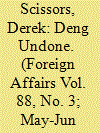| Srl | Item |
| 1 |
ID:
089223


|
|
|
|
|
| Publication |
2009.
|
| Summary/Abstract |
The year 2008 marked the 30th anniversary of the beginning of market reforms in China -- and perhaps the third anniversary of their ending. Since the present Chinese leadership took power, market-oriented liberalization has been minor. And as such policies have wound down, they have been supplanted by renewed state intervention: price controls, the reversal of privatization, the rollback of measures encouraging competition, and new barriers to investment.
|
|
|
|
|
|
|
|
|
|
|
|
|
|
|
|
| 2 |
ID:
085251


|
|
|
|
|
| Publication |
2009.
|
| Summary/Abstract |
Critics of "market fundamentalism" and "neoliberal globalization" proclaim the end of a 30-year "free-market revolution." The global financial crisis of 2008, they say, is the last gasp of unbridled capitalism. Politics will once again take primacy over the market. They hail the election of Barack Obama as the dawn of a new Age of Government and global market reregulation, in the U.S. and around the world.
|
|
|
|
|
|
|
|
|
|
|
|
|
|
|
|
| 3 |
ID:
095189


|
|
|
|
|
| Publication |
2010.
|
| Summary/Abstract |
China's post-1978 market reforms were accompanied by a drastic decline in the coverage of the Chinese population by medical insurance as well as by sharp increases in charges for medical treatments, tests, and prescriptions. Since the 1990s, these trends have produced widespread condemnation of the current Chinese medical care system for being too costly and unequal. This article attempts to answer two questions:
1) Why did changes in the healthcare system precipitated by market reforms not lead to the kind of deterioration in the health of Chinese citizens that market reforms produced in Eastern Europe and the former Soviet Union?
2) In view of the increased inequalities in access to, and insurance coverage for, medical care since 1978, and particularly the growing rural-urban gap, why do Chinese villagers and migrants rate their current health better than do urban citizens?
|
|
|
|
|
|
|
|
|
|
|
|
|
|
|
|